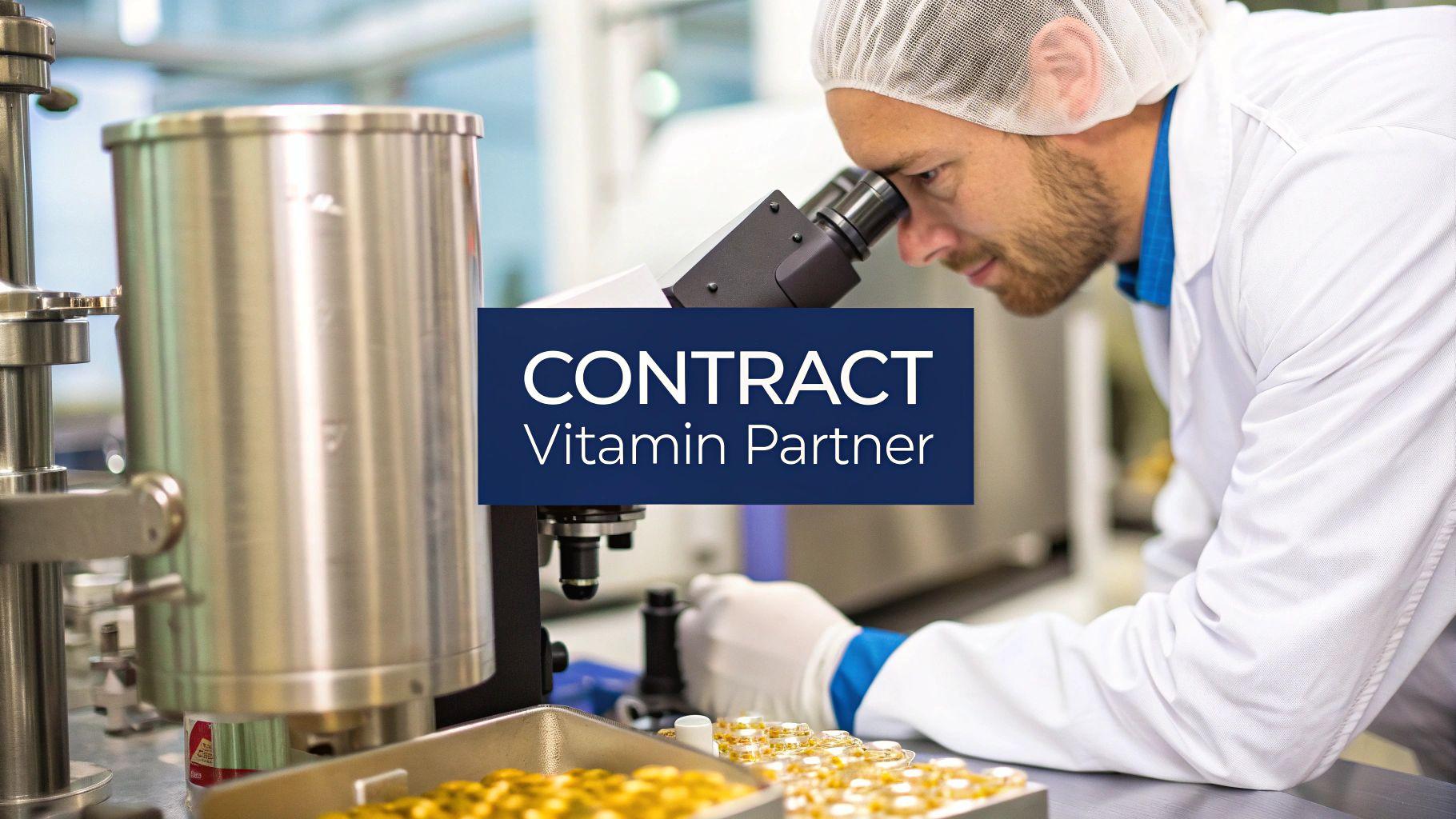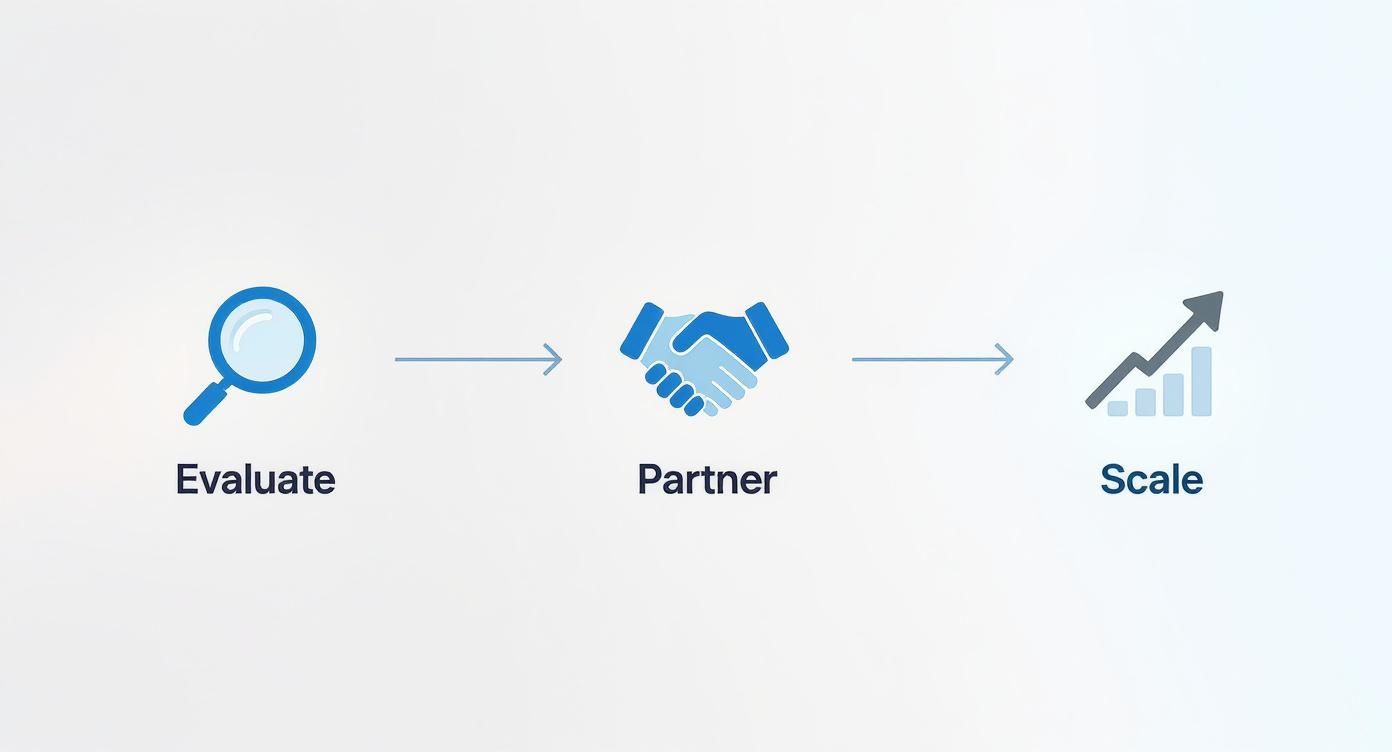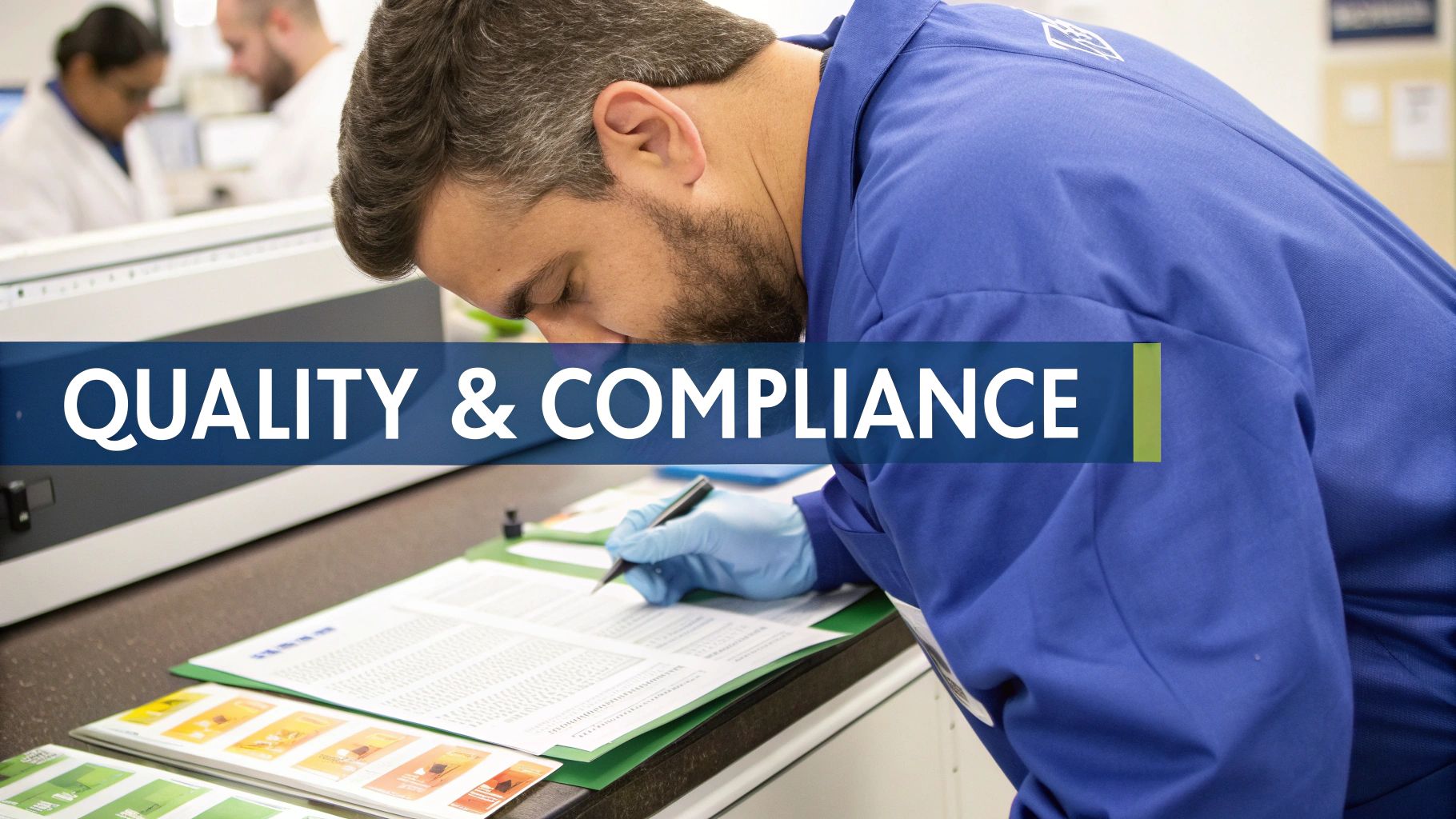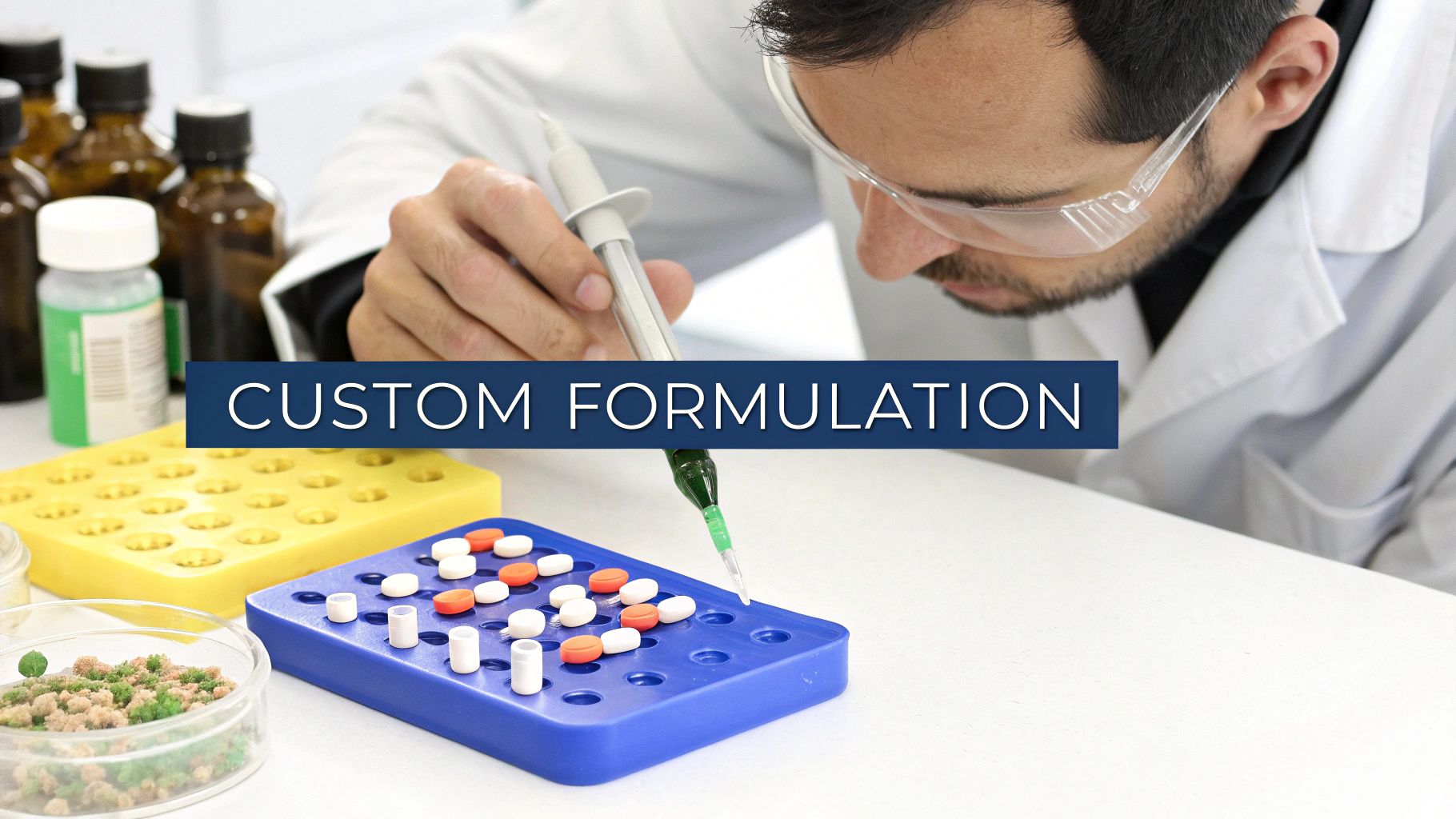How to Choose a Contract Vitamin Manufacturer for Your Supplement Brand
A practical guide to choosing the right contract vitamin manufacturer. Learn how to assess quality, customization, scalability, and partnership value.
 Get a Free Quote Today!
Get a Free Quote Today!Choosing the right contract vitamin manufacturer is the single most important decision you'll make for your brand. This isn't about finding a factory; it's about securing a strategic partner who understands your vision for quality, innovation, and growth. Your manufacturer is your R&D partner from concept through launch.
Choosing the Right Manufacturing Partner
Launching a supplement brand is a thrilling ride, but the partner you choose defines your path forward. Forget simple cost comparisons—this process is a deep dive into a potential partner's real capabilities, compliance record, and innovative spirit.
Think of it this way: a true partner is an extension of your own team. They are your collaborators, providing the R&D expertise and manufacturing excellence needed to stand out in a competitive market.
I've seen brands succeed and fail based on this one choice. The journey boils down to evaluating potential partners, forming a truly collaborative relationship, and scaling your operations together.

This visual gives you a simple roadmap, from the initial vetting call to long-term growth. Each stage builds on the one before it.
The Foundation of a Successful Partnership
The global hunger for high-quality supplements is exploding. The market for dietary supplement contract manufacturing is set to jump from USD 9.77 billion in 2025 to a massive USD 15.86 billion by 2034. That’s a huge opportunity for brands that get the fundamentals right.
North America is leading the charge, holding about 33.29% of the market share thanks to a strong consumer focus on wellness. This explosive growth hammers home how critical it is to pick a manufacturer who not only meets today's standards but is ready for what's next. Your ideal partner needs to be a perfect mix of quality, flexibility, and rock-solid reliability.
Key Pillars of a Strong Manufacturer Relationship
As you vet potential partners, your evaluation needs to zero in on a few non-negotiables. These are the pillars that ensure your product is safe, effective, and ready to scale when you are.
- Quality & Compliance: They must operate from a cGMP, UL certified, and FDA-registered facility. No exceptions. Anything less is a direct risk to your brand's reputation and your customers' safety.
- Customization & Flexibility: You need a team that can handle your custom formulas, unique flavors, and specific packaging needs. They should be just as comfortable with small pilot runs as they are with full-scale production, giving you room to grow.
- Speed & Reliability: A manufacturer committed to rapid turnarounds and transparent timelines is worth their weight in gold. A strong on-time delivery record is everything for managing your inventory and keeping customers happy.
A great manufacturing partner doesn't just take your order. They become your R&D collaborator from the moment you have an idea, helping you navigate the tricky worlds of formulation and compliance all the way through launch.
To build a partnership that lasts, you need to treat it like one from day one. Implementing strong vendor management best practices helps shift the dynamic from a simple transaction to a true strategic alliance. For more practical advice on this, check out our guide on finding a reputable supplement manufacturer for your business.
Decoding Quality and Compliance Credentials
In the supplement game, trust is built on verifiable quality and ironclad compliance. When you vet potential partners, you'll encounter an alphabet soup of certifications. Understanding these credentials is your single most important screening tool.
Think of certifications as your product's passport. Without the right stamps, it shouldn't hit the market. A contract vitamin manufacturer who sees compliance as just a box to tick is a massive red flag.

The Absolute Baseline: cGMP Certification
The credential that matters most is cGMP, which stands for Current Good Manufacturing Practices. This isn't a suggestion; it's a set of regulations enforced by the FDA to ensure the identity, strength, quality, and purity of supplements. It’s an ongoing, daily commitment to process integrity.
A cGMP-compliant facility documents everything. They track where they sourced the raw ashwagandha root, how it was handled, and every single step until it's in the final bottle. This creates a detailed audit trail that guarantees what's on your label is exactly what's in the bottle—batch after consistent batch.
This is non-negotiable. For a deeper dive, learn more about what a GMP certificate means for your brand's reputation and customer safety.
Why FDA Registration Is Just the Starting Point
Every facility involved in manufacturing, processing, or packing supplements for the U.S. market must register with the FDA. Period. But here's the catch: this is just a registration, not an endorsement. It simply means the FDA knows the facility exists and has the right to inspect it.
Consider it the absolute bare minimum. If a company's main selling point is that they're "FDA-Registered," it's like a restaurant bragging about having a business license. It’s necessary, but it says nothing about the quality.
The real proof of quality comes from the layers of certification they build on top of that registration.
Third-Party Certifications: The Extra Layer of Trust
While cGMP is the law, third-party audits offer an independent seal of approval that savvy consumers and major retailers actively look for. Certifications from organizations like UL or NSF International go far beyond standard regulatory checks.
These groups conduct voluntary—and rigorous—audits of a manufacturer's facilities, processes, and documentation. They don't just verify that a facility meets cGMP standards; they often confirm they exceed them. It's a proactive demonstration of a true commitment to quality.
A manufacturer who invests in third-party certifications like UL is signaling to you—and your customers—that they are not just compliant, but committed to being a leader in quality and safety.
In a crowded market, this is a powerful differentiator. When you're comparing two potential partners, the one with independent, third-party verification has already proven they're willing to go the extra mile.
The Real-World Consequences of Cutting Corners
Partnering with a non-compliant manufacturer isn't a minor mistake. It can be a catastrophic, business-ending decision.
Imagine launching your new liquid herbal blend, only to get a warning letter from the FDA because your manufacturer failed to flag an unsubstantiated claim. Or worse, a slip-up in quality control leads to a contaminated batch, forcing a costly and brand-destroying product recall. Any initial savings from a cheaper, less-credentialed partner will evaporate in a cloud of legal fees and shattered customer trust.
As you build your shortlist, demand proof. Here’s what to look for:
- Proof of cGMP Compliance: Ask for their most recent audit report or certification.
- FDA Registration Number: Verify it on the FDA's public database.
- Third-Party Seals: Look for logos from respected bodies like UL, NSF, or NPA.
- In-House Quality Team: Ask about their quality assurance and quality control (QA/QC) departments.
Screening for these credentials first will save you a world of hurt and weed out partners who could jeopardize your brand before you even get off the ground.
Evaluating Formulation and Customization Capabilities
Your unique formula is your brand’s greatest asset. It’s the core of your promise to customers. That’s why finding a contract vitamin manufacturer with the scientific expertise and technology to bring it to life—flawlessly—is non-negotiable.
This isn’t just about finding a production line; it's about securing a collaborative R&D partner who can elevate your vision. A manufacturer’s formulation skills directly impact your product's effectiveness, stability, and appeal.
The demand for personalized supplements is booming, especially for innovative liquid herbals. Recent supplement industry trends show how fast this market is moving, so partnering with someone who can keep up is critical.

Private Label vs. True Custom Formulation
First, understand the fundamental difference between a basic "private label" product and a truly custom formulation.
-
Private Label (Off-the-Shelf): This is a ready-made formula that the manufacturer already produces. You just add your brand's label. It’s a fast and inexpensive way to get to market, but it offers zero differentiation. You'll be selling the same product as dozens of other brands.
-
Custom Formulation: This is where serious brands play. You work hand-in-hand with the manufacturer's R&D team to develop a one-of-a-kind liquid supplement from scratch. You own the intellectual property, control every ingredient, and build something no one else has.
While private label might seem tempting, it puts a hard ceiling on your growth. A true manufacturing partner will champion the custom route, positioning themselves as an extension of your R&D team. For a deeper look, check out our guide on nutraceutical formulation development.
Gauging Their R&D Strength
A great partner doesn't just follow a recipe—they solve problems and innovate. Their R&D team should be your resource for tweaking an existing formula or building a groundbreaking one.
Let's say you have an idea for a powerful herbal tincture, but the first batch tastes incredibly bitter. A top-tier R&D team can introduce natural flavoring systems that make it delicious without compromising efficacy. That refinement could be the difference between a one-time purchase and a customer for life.
Or, perhaps your liquid supplement has stability issues, with ingredients settling at the bottom. An expert formulation team can recommend better suspension agents or adjust the particle size of your botanicals to create a perfectly consistent, shelf-stable product.
A manufacturer’s R&D lab should function as your brand’s innovation engine. They should bring new ideas to you—not just wait for instructions. This partnership mindset is a clear sign you’ve found the right fit.
Look for Forward-Thinking Technology
The best manufacturing partners constantly invest in new technology to give their clients a competitive edge. Dig into their technical capabilities. Use this checklist when interviewing potential partners to gauge their innovative strengths, especially for liquid supplements.
Key Manufacturing Capabilities to Assess
| Capability | What to Ask | Why It Matters for Your Brand |
|---|---|---|
| Advanced Botanical Extraction | "What extraction methods do you use? Do you offer options like cold-fill technology to protect delicate compounds?" | Gentler methods preserve fragile active compounds in herbs, resulting in a more potent and effective product. This is a huge quality differentiator. |
| Bioavailability Enhancement | "What technologies do you use to improve nutrient absorption, like microencapsulation or liposomal delivery?" | This is all about efficacy. Getting more of the active ingredient into the body is a powerful selling point you can market to customers. |
| Flavoring & Sweetening Systems | "Can you show us your library of natural, non-GMO, and sugar-free flavors and sweeteners suitable for liquids?" | Taste is king, even in supplements. Expertise here is crucial for creating a product people will enjoy taking every day. |
| Dosage Form Innovation | "Beyond standard liquids, what other delivery formats can you produce? (e.g., tinctures, sprays, liquid shots)" | Offering unique and convenient liquid dosage forms can help you stand out in a crowded market and appeal to different customer preferences. |
By prioritizing these advanced capabilities, you ensure your partner can not only produce your formula today but also help you innovate for years to come. Your formula is the heart of your brand. Choose a partner with deep R&D expertise to build a foundation for lasting success.
Can They Keep Up? Assessing Production Scalability and Lead Times
Your brand is built for growth, so your manufacturing partner must be ready to grow with you. The manufacturer that seems perfect for your initial 1,000-unit pilot run could become a serious bottleneck when you’re suddenly ready to order 100,000 units.
Thinking about scalability from day one isn't just a good idea—it's a core business strategy. You need a clear picture of a potential partner’s production capacity and reliability from the start. This is what separates seamless growth from painful growing pains.
Decoding MOQs and Maximum Capacity
One of the first numbers you'll see is the Minimum Order Quantity (MOQ). While a low MOQ is great for a startup testing the waters, it can also be a red flag. A manufacturer with an unusually low MOQ may lack the infrastructure for larger, more complex runs, meaning you could outgrow them quickly.
On the flip side, a high MOQ isn't automatically a deal-breaker, especially if the manufacturer is a leader in quality. But you have to be honest about whether their production capabilities align with your financial runway. The sweet spot is a partner who offers flexibility.
A great contract vitamin manufacturer can handle a pilot batch of 1,000 units with the same attention to detail as a full-scale production run of 100,000 units. Ask them about their operational range directly.
- "What’s your typical pilot run size for liquid supplements?"
- "What was the largest single production run you completed in the last year?"
- "At what volume do you suggest we transition to more automated processes?"
Their answers will tell you everything about their experience with brands at different stages. A true partner has a clear roadmap for scaling clients, helping you move from smaller batches to more cost-effective, larger runs as your brand gains traction.
Evaluating Their Supply Chain Robustness
A manufacturer is only as strong as their supply chain. A single missing ingredient can bring your production to a screeching halt, leading to stockouts that kill sales momentum. You have to dig deeper than surface-level promises.
Ask potential partners how they source ingredients. Do they have multiple, pre-vetted suppliers for key botanicals? For instance, if a bad harvest hits their primary source for Ashwagandha, what's their backup plan? A solid manufacturer will have a diversified and resilient supply chain, which minimizes your risk.
The strength of a manufacturer's supply chain is a direct reflection of their operational maturity. A partner who can't provide clear answers on supplier redundancy is a liability waiting to happen.
On top of that, ask about their inventory management systems. How do they track raw materials? Do they have climate-controlled warehousing to protect sensitive liquid extracts? These details are crucial for ensuring the consistency and availability of your product.
Focusing on Communication and Lead Times
Finally, scalability isn’t just about machinery—it’s about people and processes. Transparent communication is the glue that holds a manufacturing partnership together.
As you vet potential partners, pay close attention to how they communicate. Do they give you a clear, detailed project timeline from the beginning? A reliable partner will lay out every step, from R&D and raw material sourcing to pilot batching, full production, and final quality assurance.
Ask for their on-time delivery record. A number like "98% on-time delivery over the last 12 months" is a powerful indicator of their reliability. You should also get firm answers on their standard lead times for reorders. Knowing whether it takes four weeks or twelve weeks to get a new batch is essential for managing your inventory.
A manufacturer who gives you a dedicated project manager and sends proactive updates wants to be a collaborator, not just a supplier. That transparency builds the trust needed for a long-term partnership built for growth.
Unpacking the True Cost of Manufacturing
When you get quotes from a contract vitamin manufacturer, it's tempting to let the per-unit price dictate your decision. But that number rarely tells the whole story. The cheapest quote can quickly become your most expensive mistake once you factor in the hidden costs of poor quality, blown deadlines, and compliance nightmares.
You need a mindset shift: stop thinking "cost" and start thinking "investment." A transparent, detailed quote from a top-tier partner isn't just a bill. It's the blueprint for a successful product launch and an investment in minimizing risk and building a profitable brand.
The nutraceutical contract manufacturing space is projected to grow at a compound annual rate of about 10.4% between 2025 and 2034. This explosion is forcing the best manufacturers to up their game with better tech and bigger operations. Learn more about the rapid growth in nutraceutical manufacturing.
Deconstructing the Quote Sheet
A detailed quote is a sign of a transparent, professional partner. It should break down every expense so you know exactly where your investment is going. If you get a vague quote that lumps services into one opaque line item, consider it a red flag.
Here's what a professional proposal should include:
- Raw Material Costs: This is the biggest part of the price. A great partner will specify the source and grade of your key ingredients, showing they aren't using cheap, ineffective materials.
- R&D and Formulation Fees: This covers the science team's time to perfect your formula, run pilot batches, and ensure your product is stable and effective.
- Third-Party Testing: This is non-negotiable. It covers sending your product to an independent lab to test for potency, purity, and safety. This gets you the CoA (Certificate of Analysis) that proves your product is what you say it is.
- Manufacturing & Production Costs: This is the direct cost of the work—blending, bottling, and packaging inside their cGMP-certified facility.
- Packaging Components: Bottles, caps, seals, labels, boxes. A solid quote will itemize these so there are no surprises.
- Quality Assurance & Documentation: This fee covers the rigorous compliance checks required by the FDA to keep everything above board.
A Tale of Two Quotes
Let's play this out with a real-world scenario. You’re launching a new liquid herbal supplement and you get two quotes.
Quote A (The "Cheap" Quote): It’s a single page with a per-unit price that looks too good to be true. It has one line for "Manufacturing & Materials" and a small fee for "Packaging." It looks like a clear winner on your initial budget spreadsheet.
Quote B (The "Partner" Quote): This is a multi-page proposal. The per-unit cost is 20% higher, but it details everything: the cost of the specific organic Ashwagandha you wanted, the fees for the R&D team to develop a natural flavor masker, a separate line item for UL third-party microbial testing, and the itemized costs for the UV-protected glass bottles you requested.
The cheap quote doesn’t account for problems that are almost guaranteed to happen. When their low-grade ingredients fail a purity test, you get hit with an unexpected re-testing fee. When production falls behind schedule, a hefty "rush fee" suddenly appears. A true partner builds these quality checkpoints into the initial investment, preventing costly surprises.
With Quote A, you're constantly putting out fires. With Quote B, the manufacturer has built a process to prevent those fires in the first place.
That higher initial price from a quality contract vitamin manufacturer isn't a cost—it's an investment in a smoother, more reliable, and ultimately more profitable launch. It buys you peace of mind and a product you can be proud of.
Common Questions About Vitamin Manufacturing
Stepping into the supplement world kicks up a lot of questions, especially when hunting for the right contract vitamin manufacturer. Getting straight answers is the only way to make a smart decision for your brand.
This is your cheat sheet. We're cutting through the jargon to tackle the most important questions brand owners like you have when choosing a partner.
What Is a Realistic Timeline from Concept to Finished Product?
This is usually the first question, as your launch, marketing, and budget all hinge on this timeline. While every project is unique, a realistic window from your initial idea to a finished, market-ready liquid supplement is typically 12 to 20 weeks.
This timeline is a roadmap with several critical stops. A transparent partner will walk you through a project plan that looks something like this:
- R&D and Formulation (2-4 weeks): Your idea is turned into a viable formula that’s stable, effective, and tastes great.
- Raw Material Sourcing & Testing (4-6 weeks): Your manufacturer orders and rigorously tests every ingredient to confirm its identity, purity, and potency.
- Pilot Batching & Stability Testing (2-4 weeks): A small-scale run ensures the formula behaves correctly in a real manufacturing setting and will hold up on the shelf.
- Full Production & Final QA (4-6 weeks): Your product is manufactured at full scale, then put through a final round of comprehensive quality checks and third-party testing to generate your Certificate of Analysis (CoA).
A seasoned manufacturer won’t just give you a timeline; they’ll provide proactive updates so you’re never left guessing.
Who Owns the Intellectual Property for My Custom Formula?
Your custom formula is your brand's secret sauce. For any custom formula you pay to develop, the answer should be an unequivocal yes—you retain 100% of the intellectual property (IP).
Your manufacturing agreement needs to have this spelled out in plain English.
A rock-solid Non-Disclosure Agreement (NDA) is the first step, but it's not enough. Your contract must have an explicit clause stating that you are the sole owner of the formula. Your manufacturer is simply licensed to produce it for you. The recipe itself is yours.
This is a massive difference from private label products, where the manufacturer owns the formula. If you're serious about building a brand with long-term value, custom formulation and full IP ownership is the only path forward.
What Kind of Support Should I Expect for Labeling and Compliance?
A great manufacturing partner does more than just mix ingredients. They should be your guide through the maze of FDA regulations. Look for a partner with an in-house quality and compliance team who will put your labels under a microscope to ensure they meet strict FDA guidelines.
This support is priceless and usually involves a detailed review of:
- The Supplement Facts panel to ensure it's accurate and formatted correctly.
- Allergen declarations to ensure they’re clear and compliant.
- Marketing claims on the packaging. This is huge. They'll help ensure your claims are substantiated and permissible, saving you from a dreaded FDA warning letter.
Ultimately, legal responsibility for the label falls on your brand. But having an expert partner to guide you helps you sidestep costly mistakes. That collaborative spirit is what a real partnership is all about.
What Happens If a Production Batch Fails Quality Testing?
This question separates the pros from the pretenders. The answer reveals everything about a manufacturer’s commitment to quality and accountability. Any reputable partner will have a clear, documented protocol for handling out-of-spec (OOS) results. This should be defined in your quality agreement before production begins.
Here’s what should happen: the batch is immediately quarantined, and a thorough root cause investigation begins. If the investigation shows the failure was the manufacturer's fault—a sourcing issue, blending error, or testing mistake—they should remake the entire batch at their own cost. Period.
Their answer is a litmus test. A partner who stands behind their work and takes full financial responsibility for their errors is a partner you can trust to protect your product and your brand’s reputation.
Ready to turn your vision for a premium liquid supplement into a market-ready success? The team at Triton Nutra Group is your dedicated R&D partner, offering a full suite of services from custom formulation to compliance and fulfillment. Request a quote today and let's build something exceptional together.